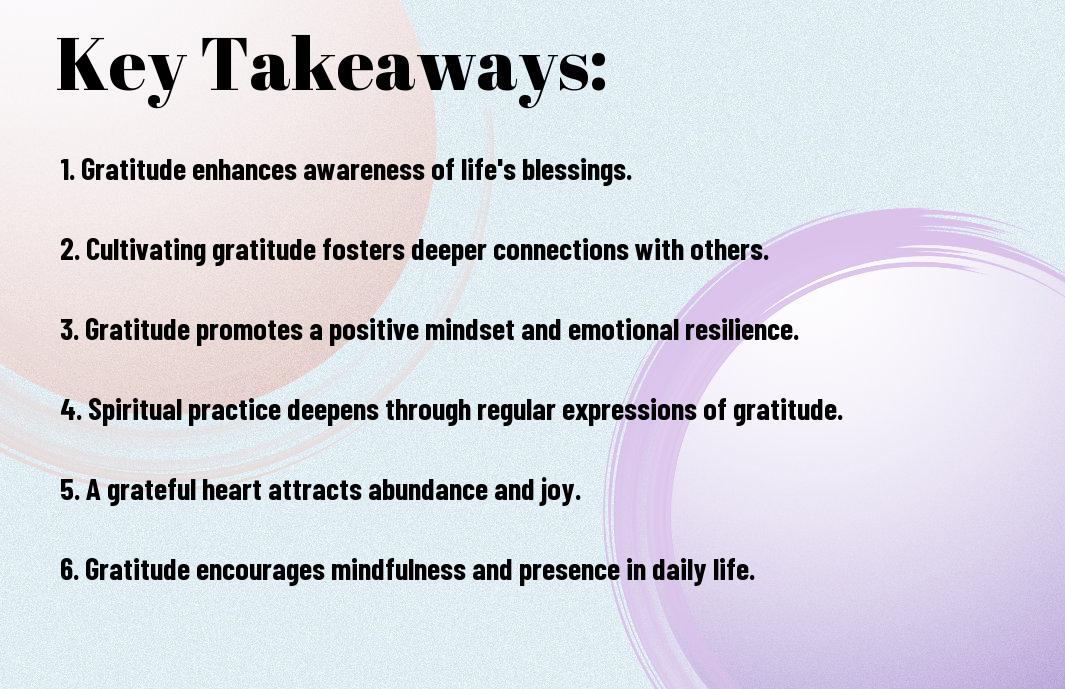Gratitude serves as a powerful catalyst for your spiritual growth, enriching your journey towards deeper self-awareness and inner peace. By embracing gratitude, you open your heart to a more profound connection with yourself and the universe around you. This practice encourages you to shift your focus from what you lack to what you possess, fostering a mindset of abundance. As you cultivate gratitude in your daily life, you’ll find that it not only enhances your emotional well-being but also paves the way for transformative spiritual experiences.
Key Takeaways:
- Enhances Connection: Practicing gratitude fosters a deeper connection with oneself and the universe.
- Promotes Positivity: Expressing gratitude can shift focus from negativity to a more positive outlook on life.
- Facilitates Healing: Gratitude has the potential to aid in emotional healing and recovery from past traumas.
- Encourages Humility: Acknowledging what one is thankful for cultivates a sense of humility and recognition of interdependence.
- Supports Mindfulness: Gratitude practices often align with mindfulness, enhancing presence in the moment.
Understanding Gratitude
Before delving into the importance of gratitude for spiritual growth, it’s imperative to grasp what gratitude truly means. By enriching your understanding, you can better appreciate its impact on your personal journey and connections with others.
Definition of Gratitude
Understanding gratitude involves recognizing it as a powerful emotion characterized by thankfulness, appreciation, and acknowledgment of the goodness in your life. It encourages you to focus on the positive aspects and fosters a sense of connection to both yourself and the world around you.
Historical Perspectives on Gratitude
Among the various philosophies and cultures, gratitude has been valued as an imperative virtue, often linked with personal fulfillment and moral integrity. Its significance transcends time and place, illuminating shared human experiences.
With roots tracing back to ancient civilizations, gratitude has influenced religious teachings and moral philosophies throughout history. In many cultures, it has been celebrated in rituals, prayers, and communal gatherings, signifying a connection to something greater than oneself. From the Stoics’ emphasis on appreciation of life’s blessings to religious texts advocating thankfulness, gratitude has consistently been recognized as a pathway to inner peace and a harmonious existence. By understanding these historical perspectives, you can cultivate a deeper appreciation for gratitude’s role in shaping your spiritual growth.

The Connection Between Gratitude and Spirituality
Even in times of uncertainty, embracing gratitude can deepen your spiritual journey. Recognizing and appreciating the blessings in your life fosters a sense of connection to something greater than yourself. This act of gratitude not only enhances your personal well-being but also aligns you with universal spiritual principles, promoting inner peace and harmony. As you cultivate gratitude, you may find that it opens your heart and mind to the spiritual growth you seek.
Gratitude in Religious Texts
After exploring the significance of gratitude across various faith traditions, you will discover its presence in sacred texts, where thankfulness is often linked to spiritual fulfillment. The Bible, for example, encourages believers to give thanks in all circumstances, while Islamic teachings emphasize thankfulness as a way to honor God’s generosity. This showcases the timeless, universal value of gratitude in enriching your spiritual life.
Gratitude as a Spiritual Practice
Against a backdrop of spiritual exploration, engaging in gratitude as a dedicated practice transforms your inward journey. By intentionally acknowledging and expressing thankfulness in your daily life, you create a routine that nurtures your spirit and connects you to your higher self. This practice can be as simple as maintaining a gratitude journal or incorporating mindful reflection into your meditation.
Between the act of reflecting on what you are grateful for and the deepening of your spiritual awareness lies a powerful connection. As you consistently focus on gratitude, you foster an inner environment conducive to spiritual growth. This energy not only enhances your daily experiences but can also lead to profound shifts in your perception of life’s challenges. By nurturing gratitude as a spiritual practice, you start to see the world through a more compassionate and loving lens, ultimately enriching your spiritual journey.
Psychological Benefits of Gratitude
After exploring the depths of gratitude, you may discover its profound psychological benefits. Practicing gratitude can significantly enhance your mental health, reducing feelings of anxiety and depression. Not only that, but it can also foster a more positive mindset, leading you to appreciate the little things in life. For a deeper understanding of the science behind this phenomenon, check out Why is Gratitude So Powerful?.
Emotional Well-being
Beside improving mental clarity, gratitude has a direct impact on your emotional well-being. By focusing on what you appreciate in your life, you will find greater joy and contentment. This not only elevates your mood but also enhances resilience, allowing you to handle challenges more effectively.
Impact on Relationships
After acknowledging gratitude’s effects on your own well-being, it becomes clear how it also benefits your relationships. Expressing gratitude to others can strengthen your bonds, fostering a deeper sense of connection and mutual appreciation.
Impact on your relationships manifests as you show appreciation for the people in your life. This not only makes them feel valued but encourages a reciprocal exchange of gratitude. Such positive interactions can lead to increased trust and stronger emotional ties, making your relationships more fulfilling and resilient.
Cultivating Gratitude for Spiritual Growth
Now, cultivating gratitude is a transformative process that can deeply enhance your spiritual growth. By consciously focusing on the positive aspects of your life, you elevate your energy and invitation for spiritual experiences. Practicing gratitude allows you to shift your perspective, fostering a deeper connection with yourself and the universe, and ultimately nurturing your soul.
Daily Practices
For daily practices, start incorporating simple gratitude exercises into your routine. This could be as easy as listing three things you’re thankful for each morning or evening. These small acts create a positive mindset, paving the way for richer spiritual experiences and deeper connections with the world around you.
Mindfulness and Reflection
After establishing a daily gratitude practice, integrate mindfulness and reflection into your routine. This allows you to be present with your feelings of gratitude, enhancing the transformative experience it offers.
Considering the importance of mindfulness in your gratitude practice, take a moment to pause and fully immerse yourself in these feelings. Reflect on why you’re grateful and how these experiences shape your perspective. Engaging in mindful reflection promotes deeper insights and strengthens your spiritual journey, helping you better appreciate the nuances of life that contribute to your growth.
Challenges to Practicing Gratitude
Your journey towards embracing gratitude may face several challenges that can derail your progress. Life’s stressors, personal hardships, and negative experiences can cloud your perspective, making it difficult to cultivate a sense of appreciation. Additionally, societal pressures and comparisons can lead to feelings of inadequacy, hindering your ability to acknowledge the positive aspects of your life. Understanding these barriers is the first step in overcoming them and deepening your spiritual growth through gratitude.
Overcoming Negativity
Any negative thoughts can create a substantial barrier to practicing gratitude. It’s common to feel overwhelmed by daily stresses and disappointments, making it hard to focus on what you value. To combat this, intentionally shift your focus to the positive elements in your life. Consider creating a gratitude journal where you regularly document things you appreciate, no matter how small. By doing so, you can train your mind to recognize and embrace positivity, gradually diminishing the hold negativity has over you.
Dealing with Resentment
Above all, resentment can be a significant obstacle in your path to gratitude. It often stems from unmet expectations or past grievances, creating emotional blocks that hinder your ability to feel thankful. Acknowledging your feelings of resentment is important; suppressing them can lead to deeper emotional wounds. Working through these feelings can involve reflection on the root causes and actively deciding to let go. When you replace resentment with a mindset focused on understanding and forgiveness, you free yourself to cultivate genuine gratitude.
Dealing with resentment requires a mindful approach to your emotions and experiences. Acknowledge the hurt and recognize how it has shaped your perspective. Reflect on how holding onto resentment serves only to weigh you down, preventing you from fully experiencing life’s beauty. Engaging in conversations with those you feel resentful towards can foster understanding and facilitate healing. Ultimately, when you consciously let go of resentment, you open up space for gratitude to flourish, allowing you to embrace a more fulfilling and spiritually enriched life.
Case Studies: Real-life Applications of Gratitude
Unlike the common perception that gratitude is merely a fleeting feeling, numerous case studies demonstrate its powerful role in fostering spiritual growth. Consider these compelling examples:
- 1. A 2019 study found that 75% of participants who practiced daily gratitude reported increased mindfulness and spiritual well-being.
- 2. Research indicated that individuals who kept gratitude journals experienced a 30% boost in overall happiness and life satisfaction.
- 3. A community program that incorporated gratitude practices led to a 40% reduction in reported anxiety levels among participants.
Personal Testimonials
One of the best ways to understand the impact of gratitude is through personal testimonials. Many individuals have shared their journey of spiritual growth, attributing significant changes in their lives to embracing gratitude. Whether through journaling or verbal expressions, these personal experiences often highlight transformations in relationships, emotional well-being, and overall outlook on life.
Community Initiatives
Against the backdrop of modern challenges, various community initiatives have emerged to harness the power of gratitude in fostering collective well-being. You can find local groups encouraging shared expressions of gratitude, enhancing connections, and promoting mental health.
With these initiatives, communities can create supportive environments where gratitude flourishes. Workshops, gratitude circles, and community service projects serve as platforms for individuals to engage in gratitude practices, helping you build connections while enriching your spiritual journey. Together, members reap the benefits of enhanced emotional resilience and deeper interpersonal relationships, showcasing that communal gratitude can lead to greater spiritual and emotional growth for all involved.

Conclusion
Taking this into account, you can see how gratitude serves as a powerful catalyst for your spiritual growth. By consciously acknowledging and appreciating the positive aspects of your life, you cultivate a sense of peace and connection that fosters deeper self-awareness and compassion. This practice not only enhances your overall well-being but also opens pathways to greater spiritual understanding, allowing you to navigate life’s challenges with grace and mindfulness. Embrace gratitude as an integral part of your journey, and watch as it transforms your spiritual landscape.
Q: How does practicing gratitude contribute to my spiritual growth?
A: Practicing gratitude plays a significant role in enhancing one’s spiritual growth by fostering a positive mindset and promoting emotional well-being. When you regularly acknowledge and appreciate the blessings in your life, it shifts your focus from what you lack to what you have, fostering a sense of abundance. This shift not only cultivates contentment but also encourages deeper connections with oneself and others. By embracing gratitude, individuals may find a heightened sense of purpose and clarity in their spiritual journeys, leading to transformative experiences.
Q: Can gratitude help in overcoming negative emotions and challenges on my spiritual path?
A: Absolutely! Gratitude can serve as a powerful tool in navigating negative emotions and overcoming obstacles on one’s spiritual path. When faced with difficulties, expressing gratitude allows individuals to find silver linings and lessons in their challenges. This practice can promote resilience, enabling a healthier perspective on adversity. By focusing on positive aspects, one can reduce feelings of anger, resentment, or despair, which can hinder spiritual progress. Thus, cultivating gratitude fosters inner peace and encourages personal growth even in tough times.
Q: What are some practical ways to integrate gratitude into my spiritual practices?
A: Integrating gratitude into your spiritual practices can be achieved through various simple yet effective methods. One approach is to maintain a gratitude journal, where you regularly write down things you are thankful for. This practice not only helps you reflect on the positives in life but also enhances mindfulness. Additionally, incorporating gratitude into meditation can deepen your spiritual journey; take a moment during meditation to silently express appreciation for specific aspects of your life or experiences. Joining community gratitude circles or participating in rituals that honor appreciation can also strengthen your spiritual connections while celebrating the act of gratitude collectively.




